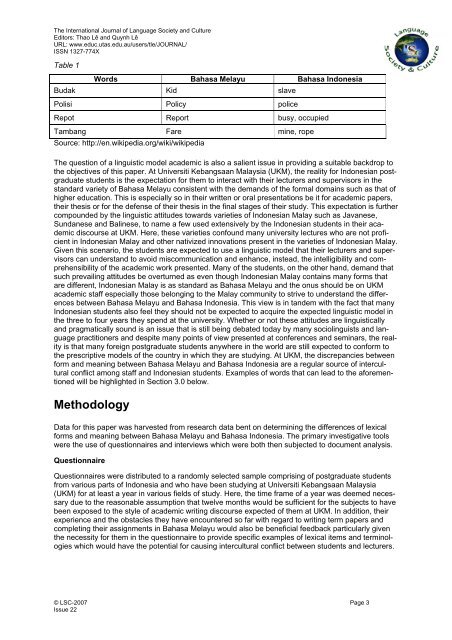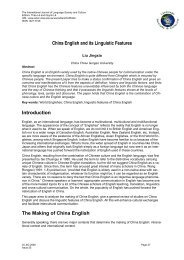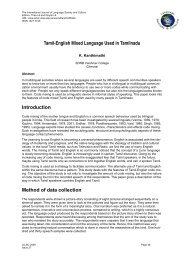The Reality of Bahasa Melayu and Bahasa Indonesia in Academia ...
The Reality of Bahasa Melayu and Bahasa Indonesia in Academia ...
The Reality of Bahasa Melayu and Bahasa Indonesia in Academia ...
You also want an ePaper? Increase the reach of your titles
YUMPU automatically turns print PDFs into web optimized ePapers that Google loves.
<strong>The</strong> International Journal <strong>of</strong> Language Society <strong>and</strong> Culture<br />
Editors: Thao Lê <strong>and</strong> Quynh Lê<br />
URL: www.educ.utas.edu.au/users/tle/JOURNAL/<br />
ISSN 1327-774X<br />
Table 1<br />
Words <strong>Bahasa</strong> <strong>Melayu</strong> <strong>Bahasa</strong> <strong>Indonesia</strong><br />
Budak Kid slave<br />
Polisi Policy police<br />
Repot Report busy, occupied<br />
Tambang Fare m<strong>in</strong>e, rope<br />
Source: http://en.wikipedia.org/wiki/wikipedia<br />
<strong>The</strong> question <strong>of</strong> a l<strong>in</strong>guistic model academic is also a salient issue <strong>in</strong> provid<strong>in</strong>g a suitable backdrop to<br />
the objectives <strong>of</strong> this paper. At Universiti Kebangsaan Malaysia (UKM), the reality for <strong>Indonesia</strong>n postgraduate<br />
students is the expectation for them to <strong>in</strong>teract with their lecturers <strong>and</strong> supervisors <strong>in</strong> the<br />
st<strong>and</strong>ard variety <strong>of</strong> <strong>Bahasa</strong> <strong>Melayu</strong> consistent with the dem<strong>and</strong>s <strong>of</strong> the formal doma<strong>in</strong>s such as that <strong>of</strong><br />
higher education. This is especially so <strong>in</strong> their written or oral presentations be it for academic papers,<br />
their thesis or for the defense <strong>of</strong> their thesis <strong>in</strong> the f<strong>in</strong>al stages <strong>of</strong> their study. This expectation is further<br />
compounded by the l<strong>in</strong>guistic attitudes towards varieties <strong>of</strong> <strong>Indonesia</strong>n Malay such as Javanese,<br />
Sundanese <strong>and</strong> Bal<strong>in</strong>ese, to name a few used extensively by the <strong>Indonesia</strong>n students <strong>in</strong> their academic<br />
discourse at UKM. Here, these varieties confound many university lectures who are not pr<strong>of</strong>icient<br />
<strong>in</strong> <strong>Indonesia</strong>n Malay <strong>and</strong> other nativized <strong>in</strong>novations present <strong>in</strong> the varieties <strong>of</strong> <strong>Indonesia</strong>n Malay.<br />
Given this scenario, the students are expected to use a l<strong>in</strong>guistic model that their lecturers <strong>and</strong> supervisors<br />
can underst<strong>and</strong> to avoid miscommunication <strong>and</strong> enhance, <strong>in</strong>stead, the <strong>in</strong>telligibility <strong>and</strong> comprehensibility<br />
<strong>of</strong> the academic work presented. Many <strong>of</strong> the students, on the other h<strong>and</strong>, dem<strong>and</strong> that<br />
such prevail<strong>in</strong>g attitudes be overturned as even though <strong>Indonesia</strong>n Malay conta<strong>in</strong>s many forms that<br />
are different, <strong>Indonesia</strong>n Malay is as st<strong>and</strong>ard as <strong>Bahasa</strong> <strong>Melayu</strong> <strong>and</strong> the onus should be on UKM<br />
academic staff especially those belong<strong>in</strong>g to the Malay community to strive to underst<strong>and</strong> the differences<br />
between <strong>Bahasa</strong> <strong>Melayu</strong> <strong>and</strong> <strong>Bahasa</strong> <strong>Indonesia</strong>. This view is <strong>in</strong> t<strong>and</strong>em with the fact that many<br />
<strong>Indonesia</strong>n students also feel they should not be expected to acquire the expected l<strong>in</strong>guistic model <strong>in</strong><br />
the three to four years they spend at the university. Whether or not these attitudes are l<strong>in</strong>guistically<br />
<strong>and</strong> pragmatically sound is an issue that is still be<strong>in</strong>g debated today by many sociol<strong>in</strong>guists <strong>and</strong> language<br />
practitioners <strong>and</strong> despite many po<strong>in</strong>ts <strong>of</strong> view presented at conferences <strong>and</strong> sem<strong>in</strong>ars, the reality<br />
is that many foreign postgraduate students anywhere <strong>in</strong> the world are still expected to conform to<br />
the prescriptive models <strong>of</strong> the country <strong>in</strong> which they are study<strong>in</strong>g. At UKM, the discrepancies between<br />
form <strong>and</strong> mean<strong>in</strong>g between <strong>Bahasa</strong> <strong>Melayu</strong> <strong>and</strong> <strong>Bahasa</strong> <strong>Indonesia</strong> are a regular source <strong>of</strong> <strong>in</strong>tercultural<br />
conflict among staff <strong>and</strong> <strong>Indonesia</strong>n students. Examples <strong>of</strong> words that can lead to the aforementioned<br />
will be highlighted <strong>in</strong> Section 3.0 below.<br />
Methodology<br />
Data for this paper was harvested from research data bent on determ<strong>in</strong><strong>in</strong>g the differences <strong>of</strong> lexical<br />
forms <strong>and</strong> mean<strong>in</strong>g between <strong>Bahasa</strong> <strong>Melayu</strong> <strong>and</strong> <strong>Bahasa</strong> <strong>Indonesia</strong>. <strong>The</strong> primary <strong>in</strong>vestigative tools<br />
were the use <strong>of</strong> questionnaires <strong>and</strong> <strong>in</strong>terviews which were both then subjected to document analysis.<br />
Questionnaire<br />
Questionnaires were distributed to a r<strong>and</strong>omly selected sample compris<strong>in</strong>g <strong>of</strong> postgraduate students<br />
from various parts <strong>of</strong> <strong>Indonesia</strong> <strong>and</strong> who have been study<strong>in</strong>g at Universiti Kebangsaan Malaysia<br />
(UKM) for at least a year <strong>in</strong> various fields <strong>of</strong> study. Here, the time frame <strong>of</strong> a year was deemed necessary<br />
due to the reasonable assumption that twelve months would be sufficient for the subjects to have<br />
been exposed to the style <strong>of</strong> academic writ<strong>in</strong>g discourse expected <strong>of</strong> them at UKM. In addition, their<br />
experience <strong>and</strong> the obstacles they have encountered so far with regard to writ<strong>in</strong>g term papers <strong>and</strong><br />
complet<strong>in</strong>g their assignments <strong>in</strong> <strong>Bahasa</strong> <strong>Melayu</strong> would also be beneficial feedback particularly given<br />
the necessity for them <strong>in</strong> the questionnaire to provide specific examples <strong>of</strong> lexical items <strong>and</strong> term<strong>in</strong>ologies<br />
which would have the potential for caus<strong>in</strong>g <strong>in</strong>tercultural conflict between students <strong>and</strong> lecturers.<br />
© LSC-2007 Page 3<br />
Issue 22




